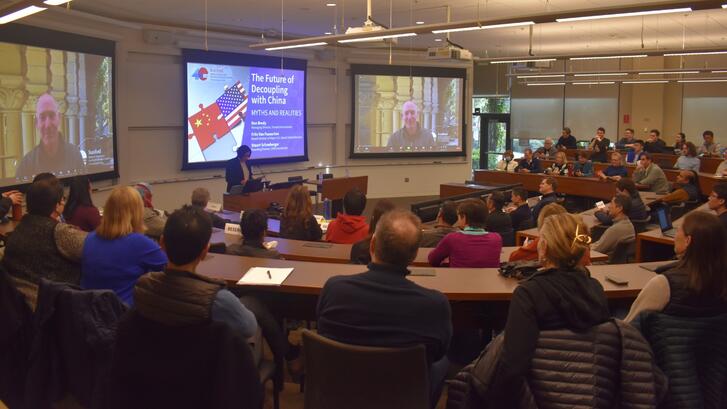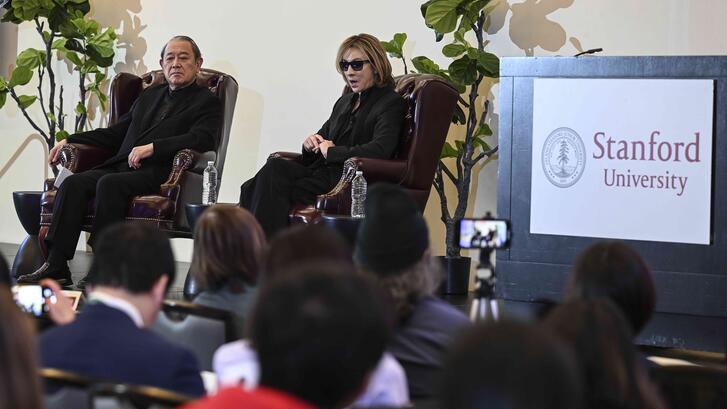Health Policy Scholars and Practitioners Examine the Future of the Field
Health Policy Scholars and Practitioners Examine the Future of the Field
In the third installment of a series recognizing the 40th anniversary of Stanford’s Walter H. Shorenstein Asia-Pacific Research Center, the Asia Health Policy Program gathered alumni to reflect on their time at APARC and offer their assessments of some of the largest challenges facing healthcare practitioners.

In the wake of a global pandemic, questions continually arise about how policymakers and healthcare providers can better collaborate to keep populations healthy and thriving under challenging circumstances. On March 8, 2023, APARC’s Asia Health Policy Program (AHPP) hosted a group of experts, all former postdoctoral fellows of the program, who shared their contributions in guiding healthcare providers and policymakers toward a better understanding of health and demographic issues and the delivery of health services.
The event was the third installment in a special series celebrating APARC’s 40th anniversary. Titled Asia in 2030, APARC@40, the series highlights core areas of the center’s expertise, examines Asia’s transformation over the past four decades, and considers the drivers and shapers of the region’s future.
The webinar featured Brian Chen, associate professor at the Arnold School of Public Health, University of South Carolina; Wasin Laohavinij, a preventive medicine physician and chief of data management at King Chulalongkorn Memorial Hospital, Thailand; Phyu Phyu Thin Zaw, a medical doctor, epidemiologist, and health systems researcher and lecturer in the School of Public Health at the Li Ka Shing Faculty of Medicine at the University of Hong Kong; Margaret Triyana, a senior economist at the World Bank's Office of the Chief Economist, South Asia Region; and Siyan Yi, a medical doctor, infectious disease epidemiologist, and assistant professor and director of the Integrated Research Program at the Saw Swee Hock School of Public Health of the National University of Singapore.
Current Endeavors in Health Policy
The speakers first shared their reflections on how the center and the program have shaped their research and professional careers. According to Brian Chen, his time at AHPP helped to “launch [his] research career, looking at how financial and legal incentives affect the delivery of healthcare in the United States and in Asia, and how that affects healthcare and health outcomes.” Chen proceeded to highlight the impact of laws and economic incentives on healthcare treatment decisions both in the U.S. and in Asia.
Margaret Triyana also reflected on ways in which the interdisciplinary research environment at APARC was instrumental in her path to policy research, stating how “my training as an economist will direct me to think about things a certain way, but there may be unintended consequences, and there's different perspectives that people from other disciplines can bring in, and that's so important…when you're able to listen to what other stakeholders have to say, research [can be] translated into policy.
The participants also shared the various projects they are currently working on, many of which focus on some of the most pressing healthcare issues today. Discussing her work with the Science in Exile Initiative, Phyu Phyu Thin Zaw, a Burmese national, described how the UNESCO-led initiative aims to bring together at-risk, displaced, and refugee scientists with other like-minded organizations, “especially to protect scientists and medical doctors, not only from Myanmar, but also from the Tigray region of Ethiopia, and from countries in protracted crises like Afghanistan, South Sudan, Syria, Venezuela, and others.”
Describing the devastating situation in Myanmar, Thin Zaw stated that “after the coup, medical doctors and scientists in Myanmar stood very firmly against the Junta, and the reaction from the Junta was violent…there are 671 incidents of violence against health care systems in Myanmar, there are 750 healthcare workers arrested right now, and at least 56 healthcare workers have been killed.” Thin Zaw hopes to support such at-risk health practitioners through the Science in Exile Initiative, without which, “we don't have any special mechanisms in place to save such kinds of scientists."
Siyan Yi discussed his work with the Integrated Research Program at the Saw Swee Hock School of Public Health, National University of Singapore, for which he leverages new technologies to impact health policy in developing countries. “We are now receiving funding from the Gates Foundation to develop community-based interventions using a mobile application and a web-based application to support and link community-based health workers to primary health care centers to ensure that newborn babies receive the services they are supposed to,” he said.
Another implementation research program that Yi operates is focused on developing and evaluating community-based innovative interventions for improving access to prevention, treatment, and care services for HIV/AIDS, tuberculosis, and sexual and reproductive health among vulnerable and marginalized populations in Southeast Asia.
Wasin Laohavinij, who serves as a chief of data management at the King Chulalongkorn Memorial Hospital in Thailand, analyzes data to identify strategies that might optimize healthcare delivery and patient outcomes. "Now we are working on how to reduce unnecessary tests and maintain equality of care for patients," said Laohavinij of reducing healthcare costs while maintaining the quality-of-care patients receive.
Laohavinij is also working on a project that he started at APARC, which analyzes data from Thailand's National Health Security Office in order to gain a clearer understanding of healthcare access and utilization. "We have expanded the dataset to include millions of people, and we see this pattern in the current system that shows some discrepancy with the government-published healthcare utilization aggregates...it is very exciting to see whether there are discrepancies or not," he said.
The Importance of Health Policy Education
For those who work in higher education, one of the best ways to promote better health policy is through training the next generation of scholars and practitioners. Thin Zaw, who lectures on health policy, mentioned that My focus is on my students...these young people are very important to bring demographic changes to Southeast Asia and across the world, so I try my best to share my personal experiences with my students and highlight the importance of the leadership and health policy, especially to achieve health outcomes for vulnerable populations and communities."
Despite the hurdles facing healthcare providers, Brian Chen also indicated that the next generation of students makes him optimistic, stating how "the majority of my students want to study a question that has personal meaning to them, to be able to take their findings and influence policy in the wide-ranging issues that we face today ...if you're one of those people, you're interested in making a difference by sharing and providing evidence-based policy recommendations."
Margaret Triyana echoed Chen's optimistic sentiment, and mentioned that "I really do see that there are opportunities...there's a growing interest among policymakers for evidence-based policy." Triyana predicted that the current global health challenges will generate interest among young people to explore not only policy research but also research more broadly. By fostering health policy education, government and education institutions can forge better health systems and promote public health awareness, leading to better patient outcomes, even in the face of institutional and geopolitical challenges.



